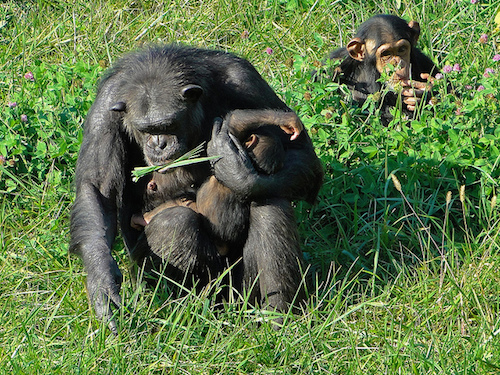From the Annals of Science: Chimp Cultures Are Less Complex than Human Cultures

Who would have thought? It turns out that chimp tribes have cultures but these are less complex and diverse than human cultures. Why? Because chimps are less inclined to learn from each other. It’s a matter of preference, not anything exceptional on the part of human beings.
Live Science reports on the new research in Biology Letters ("Human children rely more on social information than chimpanzees do"):
"This study is new in showing a species difference in readiness to incorporate social information into one’s own repertoire," study researcher Edwin van Leeuwen, a doctoral student at the Max Planck Institute for Psycholinguistics in the Netherlands, told Live Science.
Cultured chimps?
Chimpanzees live in small groups, often near other chimp "tribes." These different groups do seem to have their own cultural traditions. For example, a 2012 study in Ta� National Park in C�te d’Ivoire, found that three groups of chimps used different techniques for cracking nuts. These chimp groups interbred and intermingled, so the different tactics weren’t genetic. Rather, they were likely passed down through social learning — the definition of culture.
Still, a different technique for cracking nuts is not as dramatic as completely different languages, religions, styles of dress, social mores or traditions. Humans seem unique in the ability to splinter from one another, and it’s not clear why, van Leeuwen said.
So, cracking nuts isn’t as "dramatic" a cultural expression as creating diverse languages, faiths, arts, and the like. And it’s "not clear" why human groups create separate cultures reflecting their deep traditions and beliefs, whereas chimp do not.
Anyone who follows our colleague Wesley Smith’s reporting on challenges to human exceptionalism will know what comes next: some attempt to minimize the gaping chasm that separates humans from other creatures. Ah, here it is.
Perhaps, van Leeuwen and his colleagues thought, the difference between humans and chimps is not in capability, but in motivation.
The difference between us and chimps isn’t one of "capability" but "motivation." How was this confirmed? By comparing chimps and human children with a test involving the subject getting the opportunity to lift a cup from a row of cups under which the researchers concealed a treat.
The children watched and learned from other children’s mistakes or successes. Chimps, not so much.
While chimps picked cups at random even after seeing another chimp find a reward, human children were more likely to search in a location where they saw another kid score a treat.
The conclusion?
The findings suggest that chimpanzees are less motivated by social information than humans, he said. This, in turn, could explain chimps’ relative lack of culture; they just aren’t as interested in learning from others.
It’s not that humans have any special ability to create cultures above that of chimps, just that the chimps don’t care enough to go that extra mile. Couldn’t be bothered.
Understand? This is why for enlightenment we always need to turn to the scientists.
